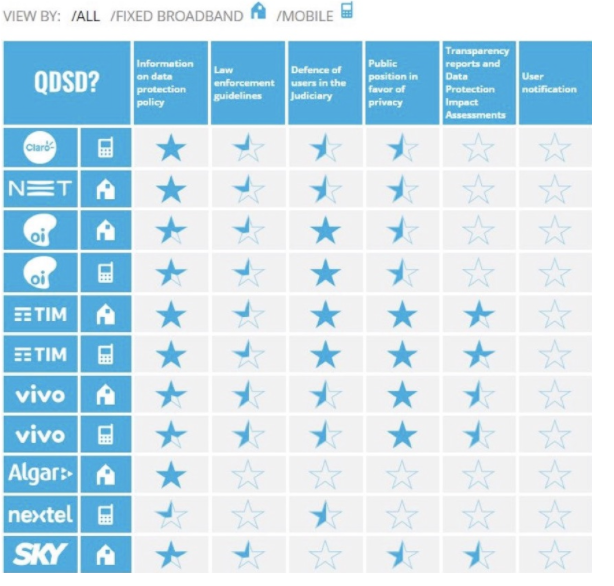
.@InternetLabbr’s fifth annual Quem Defende Seus Dados? report identifies steps companies should take to protect Brazil’s telecom privacy and data protection. /1
eff.org/deeplinks/2020…
eff.org/deeplinks/2020…
This year's @InternetLabbr’s report evaluates providers in their data protection policies, law enforcement guidelines, defending users in the judiciary and in policy debates, data protection impact assessment, and user notification. /2
quemdefendeseusdados.org.br/en/
quemdefendeseusdados.org.br/en/
In stark contrast to @InternetLabbr’s 2016 report, this year half of the telecom providers (Claro, NET, TIM, and Algar) have made significant progress in data protection, a shift primarily fueled by Brazil’s new data protection law. /3
eff.org/deeplinks/2020…
eff.org/deeplinks/2020…
This edition, featuring eight telecom providers, shows TIM leading the way, followed by Vivo and Oi right behind. Nextel scored in the last place as it did in 2019, very far away from the rest of its competitors. /4
eff.org/deeplinks/2020…
eff.org/deeplinks/2020…

This year’s report also assessed which companies stood out in publicly defending privacy against unprecedented government pressure to access telecom data during the COVID-19 pandemic. /5
eff.org/deeplinks/2020…
eff.org/deeplinks/2020…
Most Brazilian telecom providers continue to seriously lag on notifying users when the government demands their data, according to @internetlabbr's new report. Prior user notice is essential to restrict improper government data requests. /6
eff.org/deeplinks/2020…
eff.org/deeplinks/2020…
The @InternetLabbr’s "Quem Defende Seus Dados?" report also evaluates for the first time if Brazilian Telecom providers publish their own Data Protection Impact Assessment; unfortunately, none did so. /7
eff.org/deeplinks/2020…
eff.org/deeplinks/2020…
In the face of controversy on the interpretation of laws compelling companies to disclose data to the Brazilian government, this year's @internetlabbr's report also looks at companies’ transparency regarding their legal interpretation of such laws. /8
eff.org/deeplinks/2020…
eff.org/deeplinks/2020…
• • •
Missing some Tweet in this thread? You can try to
force a refresh





